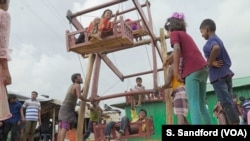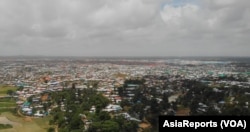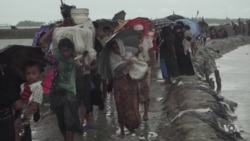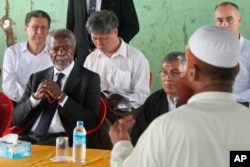The sounds of children screaming and general chaos could easily be mistaken as a bad sign, here in the one of the biggest Rohingya Muslim refugee camps in Cox’s Bazar.
This week’s Eid al-Adha religious celebration in Kutupalong refugee camp brings with it a brief moment for family and friends to commemorate the holy month and allow kids to be kids.
Children shout in glee as a team of young men power a makeshift wooden mini Ferris wheel at a festival site within the camp.
But this month also marks the one-year anniversary of a major escalation of the Rohingya crisis in western Myanmar.
A brutal clearance operation was conducted by Myanmar forces after reports of 30 attacks from the Arakan Rohingya Salvation Army, a militant Rohingya group in Rakhine state.
Refugee numbers increase
The military campaign resulted in more than 700,000 Rohingya fleeing by land and boat into Bangladesh.
Now, close to a million refugees, combining the recent influx with past refugees from decades of displacement, live in jam-packed settlements of bamboo huts nestled into the clear-cut hillsides.
The quick assembly of the shelters to accommodate the huge numbers of refugees increased the risks during the summer months from seasonal flooding, which can lead to landslides and the diseases that come with it.
Even with the dire conditions, aid agencies are recording new arrivals every week.
“Families are still arriving from Myanmar into Bangladesh, seeking safety, seeking protection, and that sends a signal to many refugees that currently it is still not safe to return to Myanmar,” Carolyn Gluck, a senior public information officer for the UNHCR, explained.
“We are very grateful that the government of Bangladesh also considers that forcible relocations, forcible return is not an option, and that’s also the stated policy of the government of Myanmar,” Gluck added.
WATCH: One Year Later, Rohingya Muslims Who Fled Myanmar Face Troubled Path
During the early days of the exodus last year, many of the new arrivals told of mass rape and torture, and the killings of thousands of their people, including women and children, that they say were committed by the army and militia groups. Myanmar has consistently denied the allegations.
Now, rights groups report harsh restrictions are being imposed on Rohingya still living in Rakhine state, including strict curfews, restricted travel, and the denial of basic rights, such as being allowed to work for their livelihood.
International access for humanitarian workers and media groups is still largely denied, despite repeated requests from the U.N., making follow-up investigations of the allegations almost impossible.
“We also need to see real accountability in Myanmar for these atrocity crimes that have been committed by the armed forces and the police in Rakhine state,” Phil Robertson, deputy director of Human Rights Watch’s Asia division, said.
Critics of new commission
With the Myanmar government assigning a third commission into the crimes, critics say it is further harming the country’s reputation.
A former member of the second advisory board, retired Thai Ambassador Kobsak Chutikul, who resigned from the committee earlier this year, said too much time has been wasted creating new boards, commissions and committees, while not addressing the core problems.
“The time for action is now because the people are suffering, the immediate humanitarian relief needs to be addressed and people need to be offered hope for the future,” Chutikul told VOA.
One of the key issues that the group was assigned to assess and implement were the recommendations of the Advisory Commission on Rakhine State, a report written by a nine-member panel led by former U.N. Secretary-General Kofi Annan. The report was released a day before the army crackdown last year.
“The more time that lapses, it will be harder to find solutions,” said Chutikul, whose opinion is shared by many observers of the ongoing crisis.
Regarding the new commission, Robertson said, “We see it very much as a primitive ploy by the government of Myanmar to try to buy time, to try to deflect attention from the fact-finding commission, and from the very urgent need to take steps to ensure accountability for the crimes against humanity that were committed against the Rohingya.”
A Myanmar government spokesman did not return a call from VOA for comments on the creation of the latest commission.
Local Rohingya leaders
As Rohingya victims await justice, leaders within the camps are joining forces to be heard in government discussions about their destiny.
Inside a long bamboo hut in Kutupalong camp, local community leaders gather with key NGO officials to discuss conditions favorable for a return to Myanmar, including recognitions as citizens and exercising the same basic rights as fellow Myanmar people.
But one local leader says there can be no resolution without accountability.
“We’ve collected data to show the government of Myanmar and the international community that we are the Rohingya from Myanmar,” Mohib Bullah, leader of the Arakan Rohingya Society for Peace and Human Rights, said.
The recently formed community group has collected more than 10,000 names of victims allegedly killed by Myanmar forces, both in the 2017 army clearance operation as well as in a previous military crackdown in October 2016.
“We collected the data for the violent cases because when we are going to the International Criminal Court for justice, the data is very important, because we can’t have success without showing it,” Bullah added.
As talks continue, with no signs of a safe return home, the Rohingya Muslims face a troubled path ahead.









